Onboard Carbon Capture has Potential to Decarbonize Shipping: GCMD
The technology could reduce the vessel’s carbon dioxide emissions by 20 percent per year with a retrofitting cost of just under 10 percent.
Onboard carbon capture and storage, or OCCS, has the potential to help maritime transport significantly reduce its greenhouse gas emissions, revealed an industry study on Thursday.
The Global Centre for Maritime Decarbonisation, the Oil and Gas Climate Initiative and Stena Bulk undertook the study to assess the viability of deploying OCCS on vessels with minimal impact on operational constraints.
According to a press statement, the project analyzed the design and cost implications of retrofitting an OCCS on the medium-range tanker Stena Impero.
The study found that the technology could reduce the vessel’s carbon dioxide emissions by as much as 20 percent per year, with a fuel consumption penalty of just under 10 percent.
The fuel consumption penalty refers to the increase in fuel usage as a consequence of retrofitting a CCS on the vessel.
Cost Effectiveness
The cost of building and installing the system on the Stena Impero is estimated at $13.6 million, with a cleanup cost of avoided CO2 for the prototype evaluated at $769 per ton CO2.
However, the consortium believes that further research and development will reduce costs, making OCCS increasingly viable for the shipping industry.
The study also looked at incorporating OCCS on newly built vessels using more efficient engines, heat pumps and alternative solvents.
“This study is a major milestone in understanding the potential of using carbon capture technology to decarbonize the shipping industry. The technical feasibility demonstrated in the project is highly encouraging,” said Michael Traver, head of OGCI’s Transport Workstream, in the statement.
“OGCI is committed to collaborating with the maritime sector to accelerate the deployment of low-carbon solutions and drive the industry towards a sustainable future.”
Commercial Acceptability
OCCS has gained traction recently as a feasible approach to meet the 2023 revised GHG emissions reduction targets of the International Maritime Organization.
However, its adoption faces numerous hurdles, including balancing the tension between maximizing CO2 capture rates while maintaining commercially acceptable capital and operational expenditure.
This study provides quantitative insights on managing the trade-offs between the actual cost of operating OCCS and its emissions reduction potential.
“For OCCS systems to be practical, the industry needs to manage captured CO2 effectively. To this end, GCMD has previously completed a study to define the operational envelope for offloading onboard captured CO2,” said GCMD CEO Lynn Loo, in the statement.
The full project report includes detailed technical specifications, cost projections, and recommendations for further development and implementation of OCCS technology in the shipping sector.
Also Read:
UN Agency Edges Closer to Global Carbon Levy on Maritime Industry: Bloomberg
Nirmal Menon
Related posts

Subscribe
Error: Contact form not found.


